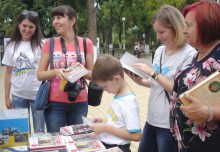The ancient city in southern Bessarabia has celebrated its 473rd birthday to the sounds of Ukrainian rock music. On September 27 the “Dunai Sich” festival was held in Izmail. Local bands were performing on stage, including the Ocheretiany Kit, Znaideni Rechi, JazzProm, Geronimo, a patriotic positive formation from Odesa “A Musician Friend,” and a rock-bard Serhii Faifura. The headliners were Haidamaky and Tin Sontsia rock bands. According to a Facebook post by Mykola Hrytsenko, president of the Charitable Foundation in Support of the Newspaper Den’s Initiatives, these bands and artists “had been waking up the patriotic consciousness until midnight!” “And there are those who need the awakening, believe me. The very word ‘Sich’ is still regarded with suspicion by many, only for being a Ukrainian word... It seems that the community of this faraway borderland is in need of a strong support from the Ukrainian mainland!” Hrytsenko wrote.
For the second consecutive year, the patriotic celebration on the banks of the Dunai have been arranged by a number of organizations: Charitable Foundation in Support of the Newspaper Den’s Initiatives, NGO “International Initiative to support Ukraine,” volunteer charitable fund of Pokrova.
“The purpose of the festival is to support Ukrainians, distribute Ukrainian quality music, culture, modern journalism, as well as to convey to the people of the Izmail raion, the Ukrainian, official view on history and modernity,” said Oleksandr Yurkov, one of the organizers.
Most of the audience was young people, mostly school children. Boys and girls gladly wrapped in blue and yellow Ukrainian flags around their shoulders and sang along. Among the guests were also many young parents with little children. However, it seems that middle-aged and older Izmailians are not yet ready to accept Ukrainian culture.
Thus, according to the frontman of the Tin Sontsia band, Serhii Vasyliuk, the locals are not too interested in the history of their own region, especially in its Cossack past. “In our country people know very little about the fact that the route to the Black Sea was created not only by Suvorov, but by the Cossacks foremost. Without them, Izmail would have never been taken from the Turks,” said the musician. “I want to believe that our festival will bear fruit, and this multinational area between the Dunai and the Dniester will see the realization of the state and national identity.”
The “Dunai Sich” was a charitable event. During the concert the volunteers had been collecting funds for the Odesa military hospital. By the way, the musicians were accompanied to the festival by fighters from the 28th Separate Guards Mechanized Brigade: Vasyl Dudko and Oleksandr Fedosiev. Fedosiev, callsign “Korea,” is an Izmail native, and he had lost his leg on the war. Recently the defender of Ukraine had celebrated his birthday, so the compatriots congratulated him on the occasion.
And while the Cossack rock music was loud on the banks of the Dunai, in the center of Izmail there was an open-air mini-exhibition of the newspaper Den. “Den’s photo exhibition is very touching, and the pictures of the war affect our souls deeply, so deep that one wants to cry. Beside them, a good contrast is provided by the photos in bright colors about life, joy, and childhood. These photos raise bright feelings,” said Vira Shcherbyna, teacher of the Izmail Art School for Children.
Residents of Izmail were also offered several new items from the Den’s Library: the books Return to Tsarhorod, Catastrophe and Triumph. Histories of Ukrainian Heroes, I, an Eyewitness. Notes from the Occupied Luhansk. The intellectual literature had aroused a lively interest in townspeople, many purchasing multiple novelties. Anastasia Shyshman, student of the Izmail State Humanitarian University, shared her opinion: “Den’s photos are living, touching, they compel one to reflect on the current situation. Pictures convey the emotions of people very clearly. I also liked the presentation of historical books from Den’s Library, because our future depends on whether we know our history and our past...” Liudmyla and Anatolii Trystan had said: “Both your exhibition and your history books are important, not only for those who support the Ukrainian idea unequivocally, but for those who doubt, perhaps even more so for the latter. I’d very much want to see the sacrifices people made, which were shown on the photos from Maidan and ATO, would have not been in vain. As for the newspaper itself, I want to say that there is much trust in Den. When we had a family discussion on what should we, given our small budget, subscribe for the following year, the first thing that came to minds of both of us was the Den newspaper.”
Moreover, according to Mykola Hrytsenko, the partners of the Den’s Foundation had backed up the subscription for the intellectual edition for all schools and libraries of Izmail raion, and presented them 30 sets of books from Den’s Library. “We hope we will yet see the appreciation for that what we sow, even in such an arid season,” Hrytsenko said. The teachers were grateful for this noble action. Nina Dudchenko, principal of Izmail school No. 16, said: “On behalf of all the teaching staff of Izmail and all the students I want to thank you for having Den visit our city with the noble educational mission. Through your projects many people open their eyes to the events in Ukraine. Thank you for the timely literature with interesting historical texts, which will help us educate the children.”
Previously, the organizers of the Izmail festivals had also arranged concerts of Ukrainian rock bands in Luhansk and Donetsk. “In the East, Ukrainians had understood that one must fight for their country. And that Ukrainian language is an additional deterrent, a factor of countering external threats. People there have clearly figured out the situation, but in Izmail many still fall for this false pretence of ‘peace.’ But yet there are many people who understood the risks of this conventional tolerance,” observes Oleksandr Yurkov.








